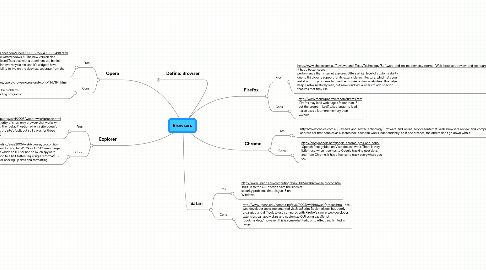
1. Opera
1.1. Pros
1.1.1. http://download.cnet.com/Opera/3000-2356_4-10005498.html Fully compatible with windows 7. The new version also highlights the Closed Tabs box with a prominent tab bar icon styled on the Windows recycle bin, and it's widgets have gained the capability to live on the desktop, separate from the browser.
1.2. Cons
1.2.1. http://www.articlesbase.com/internet-articles/opera-browser-pros-and-cons-1347164.html it is slow to download the latest version and there might be problems downloading. It is not that good for downloading programs.
2. Define: Browser
2.1. http://en.wikipedia.org/wiki/Browser_(Web) A Web browser is a software application for retrieving, presenting, and traversing information resources on the World Wide Web.
3. Explorer
3.1. Pros
3.1.1. http://www.upenn.edu/computing/eval/2005/webbrowser/procon.html speedy browser for high majority of sites. only browser that works with Windows Updates (via web). the "default" option when a site doesn't load properly (granted this is the site's fault, but still a plus for those who want/need to get there)
3.2. Cons
3.2.1. http://www.upenn.edu/computing/eval/2005/webbrowser/procon.html no tabbed browsing. no popup blocking for Win2k or XP SP1 users. large volume of cases on campus in which an IE user had so much spyware the machine/connection ground to a halt (often requiring a reformat) -> downtime removing spyware or backing up data and formatting.
4. Firefox
4.1. Pros
4.1.1. http://www.choice.com.au/Reviews-and-Tests/Technology/Software-and-online-services/Internet/Web-browsers-review-and-compare/Page/Comparison%20Table.aspx?result=true&products=product_3,product_5 It has a better score in performance than internet explorer. Offers a high level of customisability due to third-party support for its extensible architecture, which lets you install add-on programs to give the browser extra capabilities. This helps keep Firefox relatively lean, but allows individual users to add specific features that they like.
4.2. Cons
4.2.1. http://www.techsupportalert.com/firefox.htm Firefox may load web pages faster than IE but the program itself takes longer to load. It also uses a lot more memory than explorer.
5. Chrome
5.1. Pros
5.1.1. http://www.choice.com.au/Reviews-and-Tests/Technology/Software-and-online-services/Internet/Web-browsers-review-and-compare/Page/The%20Contenders.aspxChrome’s address bar that doubles as a search box. each tab works independently, so if one crashes, the others don’t go down with it.
5.2. Cons
5.2.1. http://blog.gadodia.net/google-chrome-pros-and-cons/ Speech Recognition on Vista doesn’t work. There is very little trust, when it comes to Google tracking user data, and from Chrome, it has a license to track everywhere you go.
6. Safari
6.1. Pros
6.1.1. http://www.upenn.edu/computing/eval/2005/webbrowser/procon.html built-in to the OS. doesn't have the kinds of security problems that plague IE on Windows.
6.2. Cons
6.2.1. http://www.upenn.edu/computing/eval/2005/webbrowser/procon.html has web developer tools implemented via JavaScript Bookmarklets, but poorly organzied and difficult to use compared with Firefox's similar web developer extension. can apply skins and customize GUI using JavaScript "bookmarklets;" however, this is somewhat tedious to effect and limited in range.
